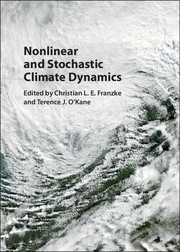Book contents
- Frontmatter
- Contents
- List of Figures
- List of Contributors
- Preface
- 1 Challenges for Ice Age Dynamics: A Dynamical Systems Perspective
- 2 Tipping Points in the Climate System
- 3 Atmospheric Teleconnection Patterns
- 4 Atmospheric Regimes: The Link between Weather and the Large-Scale Circulation
- 5 Low-Frequency Regime Transitions and Predictability of Regimes in a Barotropic Model
- 6 Complex Network Techniques for Climatological Data Analysis
- 7 On Inference and Validation of Causality Relations in Climate Teleconnections
- 8 Stochastic Climate Theory
- 9 Stochastic Subgrid Modelling for Geophysical and Three-Dimensional Turbulence
- 10 Model Error in Data Assimilation
- 11 Long-Term Memory in Climate: Detection, Extreme Events, and Significance of Trends
- 12 Fractional Stochastic Models for Heavy Tailed, and Long-Range Dependent, Fluctuations in Physical Systems
- 13 Modelling Spatial Extremes Using Max-Stable Processes
- 14 Extreme Value Analysis in Dynamical Systems: Two Case Studies
- Index
8 - Stochastic Climate Theory
Published online by Cambridge University Press: 26 January 2017
- Frontmatter
- Contents
- List of Figures
- List of Contributors
- Preface
- 1 Challenges for Ice Age Dynamics: A Dynamical Systems Perspective
- 2 Tipping Points in the Climate System
- 3 Atmospheric Teleconnection Patterns
- 4 Atmospheric Regimes: The Link between Weather and the Large-Scale Circulation
- 5 Low-Frequency Regime Transitions and Predictability of Regimes in a Barotropic Model
- 6 Complex Network Techniques for Climatological Data Analysis
- 7 On Inference and Validation of Causality Relations in Climate Teleconnections
- 8 Stochastic Climate Theory
- 9 Stochastic Subgrid Modelling for Geophysical and Three-Dimensional Turbulence
- 10 Model Error in Data Assimilation
- 11 Long-Term Memory in Climate: Detection, Extreme Events, and Significance of Trends
- 12 Fractional Stochastic Models for Heavy Tailed, and Long-Range Dependent, Fluctuations in Physical Systems
- 13 Modelling Spatial Extremes Using Max-Stable Processes
- 14 Extreme Value Analysis in Dynamical Systems: Two Case Studies
- Index
Summary
Abstract
In this chapter we review stochastic modeling methods in climate science. First we provide a conceptual framework for stochastic modeling of deterministic dynamical systems based on the Mori-Zwanzig formalism. The Mori-Zwanzig equations contain a Markov term, a memory term and a term suggestive of stochastic noise. Within this framework we express standard model reduction methods such as averaging and homogenization which eliminate the memory term. We further discuss ways to deal with the memory term and how the type of noise depends on the underlying deterministic chaotic system. Second, we review current approaches in stochastic data-driven models.We discuss how the drift and diffusion coefficients of models in the form of stochastic differential equations can be estimated from observational data. We pay attention to situations where the data stems from multi-scale systems, a relevant topic in the context of data from the climate system. Furthermore, we discuss the use of discrete stochastic processes (Markov chains) for example, stochastic subgrid-scale modeling and other topics in climate science.
Introduction
The climate system is characterized by the mutual interaction of complex systems each involving entangled processes running on spatial scales from millimeters to thousands of kilometers, and temporal scales from seconds to millennia. Given current computer power it is impossible to capture the whole range of spatial and temporal scales and this will also not be possible in the foreseeable future. Depending on the question we pose to the climate system – be it forecasting regimes in the atmosphere or simulating past ice ages – we have to make a decision as to what components to include in the analysis and as to what scales to resolve. A corollary of this decision is that each numerical scheme inevitably fails to resolve so-called unresolved scales or subgrid-scales. However, typically one is only interested at the slow processes active on large spatial scales. For example, for weather forecasts it is sufficient to resolve large-scale high and low pressure fields rather than smallscale fast oscillations of the stratification surfaces, whereas for climate predictions with a coupled ocean-atmosphere model we may want to distill the slow dynamics of the ocean ignoring weather systems interacting with the ocean on fast time-scales of days.
- Type
- Chapter
- Information
- Nonlinear and Stochastic Climate Dynamics , pp. 209 - 240Publisher: Cambridge University PressPrint publication year: 2017
- 28
- Cited by



